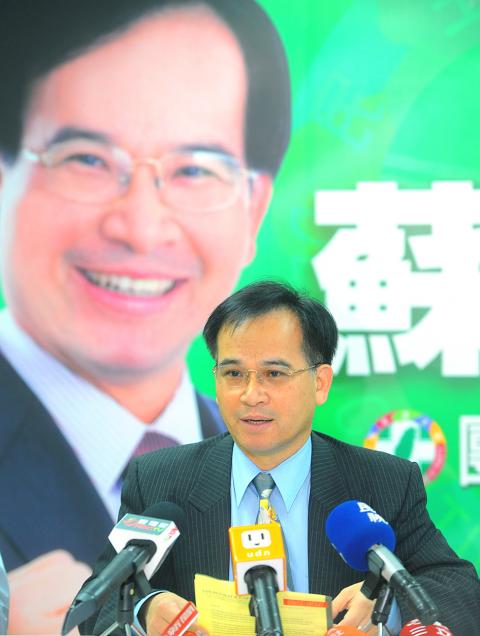Former Tainan county commissioner Su Huan-chih (蘇煥智) yesterday said he was planning to hold a march of 100,000 people on May 20 to protest against the Chinese Nationalist Party’s (KMT) “one country, two areas (一國兩區)” proposal.
The proposal, which was mentioned by former KMT chairman Wu Poh-hsiung (吳伯雄) in his meeting with Chinese President Hu Jintao (胡錦濤) in Beijing on Thursday, would have a devastating impact on Taiwan’s international status, he told a press conference.
“There is no better occasion than President Ma Ying-jeou’s (馬英九) inauguration ceremony for his second and final presidential term to voice our opposition against the proposal,” said Su, who has declared his intention to run for the Democratic Progressive Party (DPP) chair.

Photo: Wang Min-wei, Taipei Times
In the US-China Shanghai Communique of 1972, the US acknowledged a “one China” policy that stated that “all Chinese on either side of the Taiwan Strait maintain there is but one China and that Taiwan is a part of China,” he said.
Since Wu made the comment, which he said had been authorized by Ma, in China, the proposal is likely to mislead the international community into believing that Taiwan is content to be a “regional government” under China, Su said.
Also, because Wu made the comment in the People’s Republic of China (PRC), which has long been recognized by most countries in the world as the only legal government of China, Su added, most countries would likely interpret the “one country” as the PRC, not the Republic of China (ROC).
“To say that the ‘one country’ represents the ROC is self--deception,” Su said, adding that the “status quo” of cross-strait relations is “the ROC on one side and the People’s Republic of China on the other.”
The 55-year-old said the KMT is retreating from its previous position of “one China with different interpretations” and Ma’s change of position on the major issue had not been authorized by the public or backed by domestic consensus.
“The Ma administration has to realize that it cannot do anything it wants simply because Ma won a second term,” Su said.
Su said the march would be bipartisan and he called for anyone “who finds the elimination of the ROC intolerable” to participate in the march.
Various groups are also -planning to stage protests on the same day, including pig farmers, who are unhappy with Ma’s handling of the lifting of the ban on ractopamine, as well as pro-independence organizations and supporters, who are demanding Ma grant an amnesty to former president Chen Shui-bian (陳水扁), who is serving a 17-and-a-half-year sentence for corruption.
Su said he would talk to DPP interim Chairperson Chen Chu (陳菊) today about possible party support for the march, but would like to keep the amnesty issue out of the planned event, since opposition to the KMT proposal should be the main theme.

Taiwan is gearing up to celebrate the New Year at events across the country, headlined by the annual countdown and Taipei 101 fireworks display at midnight. Many of the events are to be livesteamed online. See below for lineups and links: Taipei Taipei’s New Year’s Party 2026 is to begin at 7pm and run until 1am, with the theme “Sailing to the Future.” South Korean girl group KARA is headlining the concert at Taipei City Hall Plaza, with additional performances by Amber An (安心亞), Nick Chou (周湯豪), hip-hop trio Nine One One (玖壹壹), Bii (畢書盡), girl group Genblue (幻藍小熊) and more. The festivities are to

Auckland rang in 2026 with a downtown fireworks display launched from New Zealand’s tallest structure, Sky Tower, making it the first major city to greet the new year at a celebration dampened by rain, while crowds in Taipei braved the elements to watch Taipei 101’s display. South Pacific countries are the first to bid farewell to 2025. Clocks struck midnight in Auckland, with a population of 1.7 million, 18 hours before the famous ball was to drop in New York’s Times Square. The five-minute display involved 3,500 fireworks launched from the 240m Sky Tower. Smaller community events were canceled across New Zealand’s

‘IRRESPONSIBLE’: Beijing’s constant disruption of the ‘status quo’ in the Taiwan Strait has damaged peace, stability and security in the Indo-Pacific region, MOFA said The Presidential Office yesterday condemned China’s launch of another military drill around Taiwan, saying such actions are a “unilateral provocation” that destabilizes regional peace and stability. China should immediately stop the irresponsible and provocative actions, Presidential Office spokeswoman Karen Kuo (郭雅慧) said, after the Chinese People’s Liberation Army (PLA) yesterday announced the start of a new round of joint exercises around Taiwan by the army, navy and air force, which it said were approaching “from different directions.” Code-named “Justice Mission 2025,” the exercises would be conducted in the Taiwan Strait and in areas north, southwest, southeast and east of Taiwan

UNDER WAY: The contract for advanced sensor systems would be fulfilled in Florida, and is expected to be completed by June 2031, the Pentagon said Lockheed Martin has been given a contract involving foreign military sales to Taiwan to meet what Washington calls “an urgent operational need” of Taiwan’s air force, the Pentagon said on Wednesday. The contract has a ceiling value of US$328.5 million, with US$157.3 million in foreign military sales funds obligated at the time of award, the Pentagon said in a statement. “This contract provides for the procurement and delivery of 55 Infrared Search and Track Legion Enhanced Sensor Pods, processors, pod containers and processor containers required to meet the urgent operational need of the Taiwan air force,” it said. The contract’s work would be